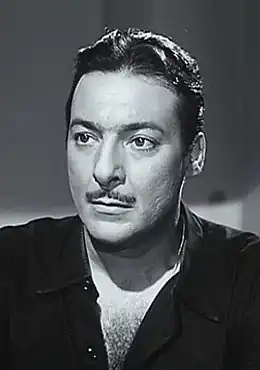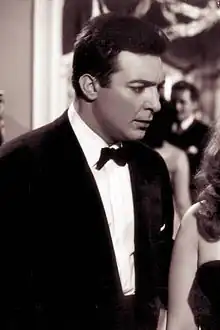Rushdy Abaza
Rushdy Saiid El Bughdady Abaza, en arabe رشدي سعيد البوغدادي أباظة, né le 3 août 1926 à Mansourah (Égypte) et mort le 27 juillet 1980, est un acteur de cinéma et de télévision égyptien. Il est considéré comme l'un des plus beaux acteurs de l'industrie cinématographique égyptienne.

| Naissance | |
|---|---|
| Décès |
(à 53 ans) |
| Nationalité | |
| Formation | |
| Activités | |
| Période d'activité |
à partir de |
| Famille |
Abaza clan (en) |
| Conjoints |
Samia Gamal (de à ) Sabah () Taheyya Kariokka |
امرأة في الطريق (d), Angel and Devil (d), The Second Man (d), Je veux une solution |
Biographie
Rushdy Abaza naît à Mansourah, en Sharqia, en Égypte, d'un père égyptien et d'une mère italienne. Son père, Said Abaza, appartient à l'une des familles les plus notables d'Égypte, la famille Abaza[1]. Rushdy étudie au Collège Saint Marc à Alexandrie, une école catholique lassalienne de langue française.
Il a trois demi-sœurs du côté paternel, Ragaa, Mounira, Zeinab et un demi-frère, Fekri, qui devient également un acteur. Du côté de sa mère, il avait un demi-frère, Hamed.

Il est marié trois ans avec Tahiya Carioka (1915-1999), actrice et danseuse égyptienne. Il épouse en 1954 Barbara, une Américaine, et ont une fille, Kismat. En 1958, il épouse Samia Gamal, célèbre danseuse égyptienne avec qui il a joué en 1949. Elle tient ensuite le premier rôle dans plusieurs films avec lui. Ils se marient en 1960 et restent ensemble pendant dix-huit ans. Il épouse en 1977 Sabah (1925-2014), célèbre chanteuse libanaise, alors qu'il est toujours marié à Samia Gamal - ils divorcent quelques jours plus tard[2]. En raison de ses excès (et notamment de son alcoolisme) Samia Gamal finit par le quitter en 1978[3]. Sa cinquième épouse est une cousine, Nabila Abaza[3].
Le , il meurt d'un cancer du cerveau, à l'âge de 53 ans[1].
Filmographie
Il apparaît dans plus de 100 films de 1948 à 1980[4] - [5].
1948
- El-Millionaira El-Saghira (en anglais The Small Millionaire)
1949
- Zou El-Waghein (The Man with Two Faces)
1950
- Emraa Menn Nar (A Woman of Fire)
1951
- Awlad El shareh
- Amina
1952
- Al-Osta Hassan (Hassan the Craftsman)
- El-Montasser (The Conqueror)
- Awladi (My Children)
1953
- Shamm al-Nesseem (The Spring Festival)
- Mouamara (Conspiracy)
1954
- La Vallée des rois - Robed Man (non crédité)
- Gaaluni Mogremann (They Made Me a Murderer)
- Erham Domouie
1955
- Fortune carrée (Square Fortune)
- Enni Rahhela (I Depart)
- Hayah Aw Moot (Life or Death)
- Arayess Fel-Mazad (Brides for Auction)
1956
- Mawed Gharam
- Les Dix Commandements (film, 1956)
- Dalila
- Mann al-Qattel? (Who Is the Murderer?)
- Ezzay Ansak (How Would I Forget You)
- Ismaeel Yassin fel-Boliss (Ismaeel Yassin in the Police)
- Bahr al-Gharam (Sea of Love)
1957
- Tamr Henna (Tamarind) - Hassan
- Rodda Qalbi
- La Anam - Samir
- Port Said
- Lan Abki Abadan (I Shall Never Weep)
1958
- Djamila l'Algérienne (Jamila Buhreid) - Bigeard
- Toggar al-Moat (Death Merchants) - Ra'oof
- Tareeq al-Ammal
- Soultan (1958)
- Emraa fel-Tareeq (A Woman on the Road)
- Qoloob al-Azara (Hearts of the Virgins)
1959
- El rajul el thani
- Seraa Fel-Nil
- Samraa Sina (The Brunette of Sinai)
- Rehla ilal kamar
- Maleesh Gherak (I Have None But You) - Fathi
- Katia tarik
- Bafakkar Felli Nassini (Thinking of Who Forgot Me)
- Ana Baree'a (I am Innocent)
- Qatte' Tareeq (The Highwayman)
1960
- Malak wa Shaytan (Angel and Devil) - Ezzat
- Ana wa Ommi (My Mother and I)
- Al-Moraheqat - Adel
- Ya Habeebi (My Beloved)
- Nehayat al-Tareeq (End of the Road)
- Mufattesh al-Mabaheth (The Police Inspector)
- Leqaa Fil-Ghoroob (Meeting at Sunset)
- Kholkhal Habeebi (My Love's Bugle)
- Al-Raggol al-Thani (The Second Man)
1961
- Wa Islamah (L'Épée de l'Islam) - Prince Baybars
- Qalb Fi Zalam (Heart in the Shadows)
- Hob wa Herman (Love and Deprivation)
- He Talata - Kamal
- Fi baitina rajul - Abd El-Hamid
- Bela Awdah (No Return)
1962
- Al zouga talattashar
- Helwa wa kaddaba
- Sett el-Banat (The Lady of All Women)
- Ah Menn Hawwa (Beware of Eve)
- Shahidat al-Hob al-Elahi (Martyr of Divine Love)
1963
- La Waqt lel-Hob (No Time for Love)
- Aroos al-Nil - Sami Fouad (Engineer)
- Tareeq al-Shaytan (The Way of the Devil)
- Al-Saherra al-Saghira (The Young Charming) - Essmat el daramaly
- Al-Maganin Fi Naeem (The Insane Are in Bliss)
- Amirat el Arab
1964
- Al-Tareeq (The Road) - Saber
- Fatat shaza
- Al-Shayatin al-Talata (The Three Devils) - Saadawy
- Al badawia fi Paris
1965
- Ganab al-Safeer (His Excellency the Ambassador) - Amin (Samia's Father)
1966
- Addow Al-Maraa (Enemy of Women) - Essa
- Zawga Menn Paris
- Shaqqet Al-Talabba (The Students' Apartment) - Saad Selim
- Saghira Ala Al-Hob - Kamal
- Mabka el oshak
- Howa wal-Nessaa (He and Women)
- Guanab el safir
- Al-Moshagheboon (Troublemakers) - Amin
- Shaqawet Reggala (Naughty Men)
- Mawwal (with Sabah the Lebanese Singer (A Ballad))
1967
- Gareema fil-Hayy al-Hadi (Crime in the Calm District) - Ahmed Ezzat
- Endama Nohheb (When We Love) - Ahmed
- Al-Aib (Shame) - Mohamed El-Guindy
- Al-Qobla al-Akhira (The Last Kiss) - Samy, The Director
1968
- Raw'at el-Hob (The Beauty of Love) - Ahmed Ragab
- Hawwaa ala al-Tareeq (Eve on The Road) - Khaled
- Al-Massageen al-Thalatha (The Three Prisoners) - Mr. Joe
- Baba Ayez Keda (Dad Wants So) - Kamal
1969
- El Shoug'an el Thalatha
- Nos Sa'a Gawaz (half an Hour of marriage)
1970
- Ghoroob wa Shorouq (Sunset and Sunrise) - Essam
- Al-Hob al-Daaie (The Lost Love)
- Al-Sarab (The Mirage) - Dr.Amin
- Al-Ashrar (Evil Men)
- Nar al-Shouq (Flame of Crave)
- Zawga le-Khamsat Regal (Wife of Five Men)
1971
- Shay' fi Sadri (Something in My Heart)
- Ebnati al-Aziza (My Dear Daughter) - Sherif
- Emraa wa Raggol (A Woman and A Man)
1972
- Emraa le-Koll al-Regal (A Woman for All Men) - Zaki
- Saaett al-Sefr (Zero Hour) - Hussein
1973
- Hekayti Maa Al-Zaman (My Story with Life)
1974
- Ayna Aqli (Where is My Mind) - Zohdi
1975
- Youm al-Ahad al-Damy (Bloody Sunday)
- Oreedo Hallan (Je veux une solution)
- Hobi al awal wa al akhir
- Abadan Lann Aaoud (I Shall Never Come Back)
1976
- Tawheeda
- A world of children - Helmi Abdulqader
1977
- Al Domo Fe Ouyon Dhahekah
- Ah Ya Leil Ya Zamman (Oh Night, Oh Life)
1978
- Wa Daa al-Omr Ya Waladi (Life Has Gone, My Son)
- Al-Qadi wal-Gallaad (The Judge)
1979
- Le-Mann Toshreq al-Shams (For Whom the Sun Rises?)
1980
- Daerrat al-Shakk (Circle of Suspicion)
- Azkeyaa Lakken Aghbeyaa (Intelligent But Stupid) - Hamdi (final film role)
Notes et références
- (en) Cet article est partiellement ou en totalité issu de l’article de Wikipédia en anglais intitulé « Rushdy Abaza » (voir la liste des auteurs).
- « Rushdi Abaza, AlexCinema », www.bibalex.org
- (en-GB) « Sabah - obituary », The Telegraph, (ISSN 0307-1235, lire en ligne, consulté le )
- Soha Gaafar, « Rushdy Abaza, le “Don Juan” omniprésent du cinéma », sur Le Progrès Egyptien, (consulté le )
- (en) ydha001, « Who is Najat Al Saghira? », sur najatalsaghira, (consulté le )
- SensCritique, « Œuvres avec Rushdy Abaza », sur SensCritique (consulté le )
Article connexe
Bibliographie
- Daoud, Abd el Ghani. (1997). Madâres el Adâ'' el Tamthîlî fî târîkh el Cinéma el Misreyah . Le Caire : el Hay'a el 'Ama li Qosour el Thaqâfah.
- Kassem, Mahmoud. Mawsou'at el Momathel fi-l-Cinema el 'Arabiya . Caire.
- Labib, Fomil. (1973). Nougoum 'Areftahom. Le Caire : Ketab el Helal.
- Ramzi, Kamal. (1997). Nogoum el Cinema el Misreyah : el Gawhar we-l-Aqni'a . Le Caire : Le Conseil suprême de la culture.
- Wassef, Magda. (1995). Egypte : 100 ans de Cinéma . Paris : Institut du Monde Arabe.
Liens externes
- Ressources relatives à l'audiovisuel :
- Rushdi Abaza sur le site du service d'information de l'État égyptien